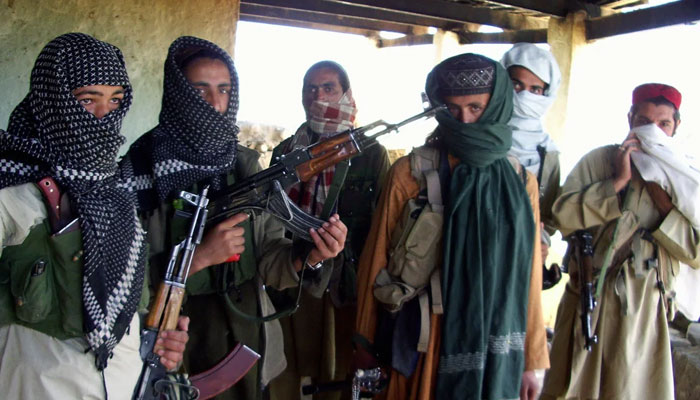Sanctuaries of terror
In August 2021, the Afghan Taliban took over Kabul. In almost three years since then, Pakistan has seen a resurgence of terrorist attacks
Earning a reputation as a haven for terror groups is not going to help any country. This is something even the Afghan Taliban regime in Afghanistan will need to understand. Perhaps the gravity of the situation will have hit home yesterday, with the US also officially urging Afghanistan to prevent terror attacks from its soil. The Americans have also asked for any security operation launched by Pakistan to ensure protection of civilian lives. The statements came a day after Pakistan carried out intelligence-based anti-terrorist operations in the border regions inside Afghanistan. According to Pakistan’s Ministry of Foreign Affairs, the prime target of Monday’s operation were terrorists belonging to Hafiz Gul Bahadur Group, which along with the Tehreek-e-Taliban Pakistan (TTP), is said to be responsible for multiple terrorist attacks inside Pakistan. The latest attack took place on March 16 at a security post in Mir Ali in North Waziristan and claimed the lives of seven Pakistani soldiers. Pakistan has reminded Afghanistan that for the last two years, the country has consistently conveyed its serious concerns to the Afghan Taliban regime about the presence of terrorist outfits on Afghan soil, including the TTP. When these terrorists keep launching attacks in Pakistan while they have safe havens in Afghanistan and the Afghan Taliban refuse to take any action against them, there is only so far that Pakistan can wait and watch as its people get killed and martyred.
While Pakistan has always prioritized dialogue and cooperation, it has pointed out that elements that are “actively patronizing the TTP and using them as a proxy against Pakistan” have undermined Pakistan – a neighbour that has always stood with the people of Afghanistan through thick and thin. Pakistan has also rightly pointed out that terrorist groups like the TTP are “a collective threat to regional peace and security” and therefore Pakistan will prevent such outfits from sabotaging bilateral relations with Afghanistan.
In August 2021, the Afghan Taliban took over Kabul. In almost three years since then, Pakistan has seen a resurgence of terrorist attacks. This is obviously not a coincidence. More than 80,000 lives were lost at the hands of these terrorists and a long battle spanning over a decade was successfully fought to get rid of them by our security forces. Khyber Pakhtunkhwa and former Fata have seen the worst violence in recent decades at the hands of the TTP. It was only after the APS attack that a proper political consensus was built around a military operation to eliminate terrorist networks from Pakistani soil. We were successful in eliminating terrorist outfits but now all that effort seems to be slipping away due to the Afghan Taliban and their refusal to act against terrorists on their soil. Almost three years of Taliban rule in our neighbourhood has changed the strategic and security landscape of our country. From KP to Balochistan, from Karachi to Islamabad, the TTP and its affiliates have carried out terrorist attacks across the country. Pakistan gave fair warning to the Afghan Taliban to hand over TTP leadership but there has been little by way of cooperation from across the border. This not only affects Pakistan’s security but also leads to forms of xenophobia and resentments on all sides. Pakistan and Afghanistan need to combat terror together: the Afghan Taliban must be prevailed upon to understand this reality and enter the modern age not just in terms of security but also education, healthcare and governance. That would go a long way in ensuring protection of all people on both sides of the border.
-
 ‘Disgraced’ Andrew Still Has Power To Shake King Charles’ Reign: Expert
‘Disgraced’ Andrew Still Has Power To Shake King Charles’ Reign: Expert -
 Why Prince William Ground Breaking Saudi Tour Is Important
Why Prince William Ground Breaking Saudi Tour Is Important -
 AOC Blasts Jake Paul Over Bad Bunny Slight: 'He Makes You Look Small'
AOC Blasts Jake Paul Over Bad Bunny Slight: 'He Makes You Look Small' -
 At Least 53 Dead After Migrant Boat Capsizes Off Libya
At Least 53 Dead After Migrant Boat Capsizes Off Libya -
 'God Of War' Announces Casting Major Key Role In Prime Video Show
'God Of War' Announces Casting Major Key Role In Prime Video Show -
 Real Reason Prince William, Kate Broke Silence On Andrew Scandal Revealed
Real Reason Prince William, Kate Broke Silence On Andrew Scandal Revealed -
 Drew Barrymore Responds To 'Charlie's Angels' Costar's Comments About Her
Drew Barrymore Responds To 'Charlie's Angels' Costar's Comments About Her -
 Shakira Slips Hard On Stage During Life Show
Shakira Slips Hard On Stage During Life Show -
 King Charles Speaks Out Over Andrew's Scandal: 'Stand Ready To Help Police'
King Charles Speaks Out Over Andrew's Scandal: 'Stand Ready To Help Police' -
 Dax Shepard Recalls Horrifying Accident That Almost Killed Him
Dax Shepard Recalls Horrifying Accident That Almost Killed Him -
 Logan Paul's Bodyguard Hits Fan On Super Bowl Day
Logan Paul's Bodyguard Hits Fan On Super Bowl Day -
 Epstein Files: Anne Hathaway Mentioned As Highly Desired Guest For Bill Gates?
Epstein Files: Anne Hathaway Mentioned As Highly Desired Guest For Bill Gates? -
 Prince Harry Under A Lot Of Stress As Meghan Markle Makes Bizarre Demands
Prince Harry Under A Lot Of Stress As Meghan Markle Makes Bizarre Demands -
 Princess Beatrice, Eugenie's Subtle Break From Disgraced Parents Exposed
Princess Beatrice, Eugenie's Subtle Break From Disgraced Parents Exposed -
 Baby Left In Running Bathtub Dies After Father ‘forgets’ Him
Baby Left In Running Bathtub Dies After Father ‘forgets’ Him -
 King Charles Takes A Major Step To Keep Horrified Prince William Out Of The Loop On Andrew: Insider
King Charles Takes A Major Step To Keep Horrified Prince William Out Of The Loop On Andrew: Insider




